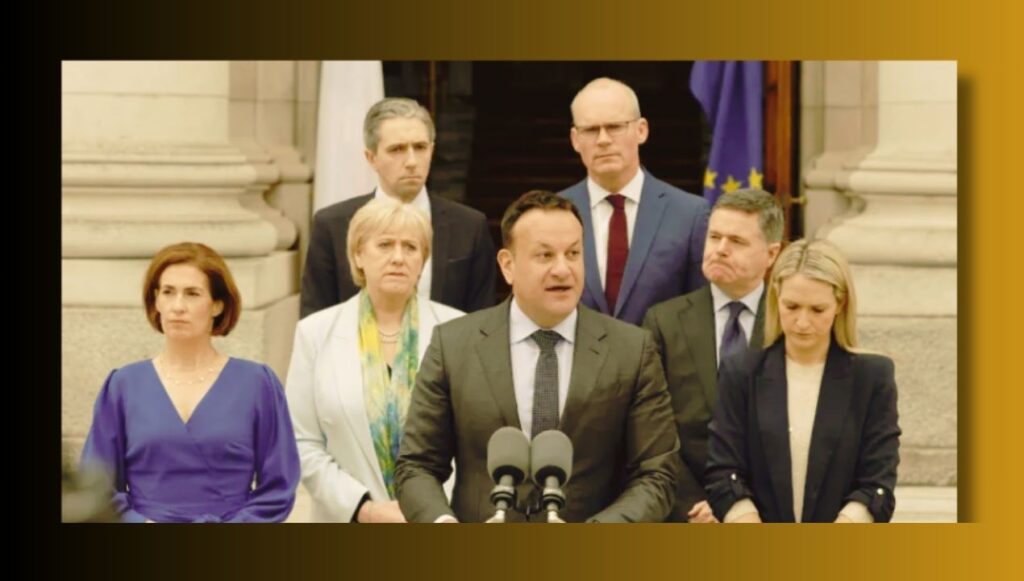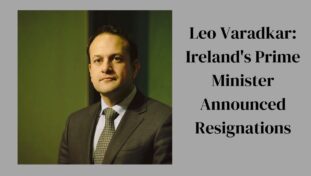Ireland’s Prime Minister Leo Varadkar Resigns Amid Political Turmoil
Leo Varadkar, Ireland’s Prime Minister and a prominent figure in the country’s political landscape, has announced his resignation, sending shockwaves through the nation. Varadkar’s decision, attributed to both personal and political reasons, marks a significant turn in Irish politics.
A Surprising Announcement
Varadkar’s resignation comes in the wake of a double referendum defeat related to family matters. The proposals, aimed at broadening the legal definition of family and removing sexist language from the Irish Constitution, faced rejection from voters. These setbacks, coupled with a decline in public support for his party, Fine Gael, led Varadkar to step down from both his role as Prime Minister and party leadership.
Varadkar’s Political Legacy

Born to an Irish mother and a father of Indian descent, Varadkar made history as Ireland’s youngest-ever Prime Minister in 2017, at the age of 38. He also became the first openly gay Taoiseach, reflecting Ireland’s evolving societal landscape. Throughout his tenure, Varadkar championed progressive causes, including campaigns to legalize same-sex marriage and repeal the abortion ban, reshaping Ireland’s social and legal frameworks.
Fine Gael’s Struggles
Despite Varadkar’s achievements, Fine Gael has faced challenges, particularly in recent years. The party’s support stagnated, leading to a third-place finish in the 2020 election. The rise of Sinn Féin, advocating for the reunification of Northern Ireland with the Republic, further complicated Fine Gael’s position.
The Road Ahead
Varadkar’s departure leaves a void in Irish politics, with Fine Gael now tasked with electing a new leader to navigate the upcoming general election. The announcement comes amidst a backdrop of domestic challenges, including a housing crisis and a rise in anti-immigration sentiments.
Reflections and Farewells
As Varadkar bids farewell, he reflects on his tenure, acknowledging both successes and shortcomings. Despite facing criticism for the recent referendum defeats, he expresses pride in advancing equality and modernizing Ireland.
Looking Forward
While Varadkar’s resignation marks the end of an era, it also presents an opportunity for renewal within Fine Gael. With the next election looming, the party must regroup and address the pressing issues facing the nation.
Final Thought
Leo Varadkar’s resignation signals a pivotal moment in Irish politics, highlighting the complexities of governance and the ever-changing dynamics of public opinion. As Ireland prepares for a new chapter, the legacy of Varadkar’s leadership will undoubtedly leave a lasting impact on the nation’s trajectory.
FAQs:
- Who resigned as Ireland’s Prime Minister?
- Leo Varadkar
- When did he announce his resignation?
- March 2024
- What reasons did he give for resigning?
- He cited both “personal and political” reasons, but mainly political ones. He didn’t elaborate further.
- What was his role in Irish politics?
- Varadkar served as Prime Minister twice: 2017-2020 and again since December 2022 (part of a power-sharing agreement).
- He was also the leader of the Fine Gael party.
- What were some of his achievements as Prime Minister?
- Oversaw the legalization of same-sex marriage (2015) and abortion (2018) referendums.
- Played a key role in securing post-Brexit concessions from the UK regarding the Irish border.
- What were some of the challenges he faced?
- A decline in support for Fine Gael in recent years.
- The recent defeat of two government-backed referendums on constitutional changes related to family definition and women’s roles.
- A housing crisis and rising cost of living.
- A growing anti-immigration sentiment.
- What is the current state of the Fine Gael party?
- Fine Gael is facing internal struggles and has seen a number of its members announce retirement before the next election.
- What is the upcoming political timeline in Ireland?
- Fine Gael will choose a new leader on April 6th, 2024.
- A new Prime Minister is expected to be elected after parliament’s Easter break.
- A general election must be held by early 2025.
- Who is currently the leader of the opposition party?
- Micheál Martin, leader of Fianna Fáil (coalition partner in the current government).
- What are some of the key issues facing Ireland in the upcoming election?
- The housing crisis and cost of living.
- Immigration and social services.
- The future of the Irish economy post-Brexit.
- Who is considered the favorite to win the next election?
- It’s currently unclear. Polls show declining support for both Fine Gael and Fianna Fáil, with Sinn Fein (historically advocating for Irish reunification) being the most popular party.
- What is the significance of Leo Varadkar’s resignation?
- It reflects the challenges faced by the current government and Fine Gael.
- It opens the door for potential changes in Irish leadership and policy direction.
- How will Varadkar’s resignation impact Ireland’s relationship with the UK?
- Varadkar played a key role in post-Brexit negotiations. The impact of his departure on future UK-Ireland relations remains to be seen.
- How will Varadkar’s resignation impact the ongoing debate on Irish reunification?
- It’s difficult to say definitively. However, the rise of Sinn Fein could potentially influence the discourse on reunification.
- What are some resources for staying informed about Irish politics?
- Major news outlets with Irish coverage (BBC, The Guardian, Irish Times)
- Reputable websites and social media accounts of Irish political parties and institutions.
OTHER LINKS:
🏏 In a major leadership change, MS Dhoni steps down as CSK captain and Ruturaj Gaikwad takes over for IPL 2024—read the full story and fan reactions here.

